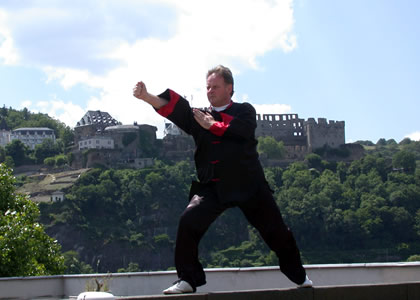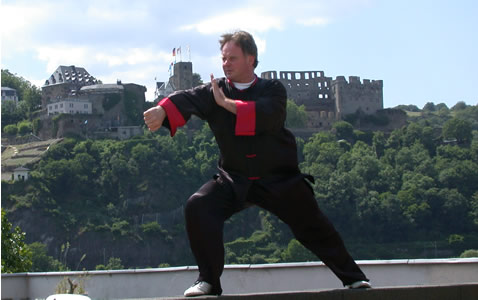Tongbei Quan

Although I have over 35 years' intensive personal and professional experience of a wide range of well-known and lesser known martial arts systems from ancient China and have aquired an extremely intimate knowledge of them, it was only in 2002 that I encountered a system which had been completely unknown to me up until then. I was immediately captivated by it: I had never seen such fast and unorthodox movements in any martial art. I was reminded of a kind of Chinese 'Schuhplattler' dance, because the master I saw demonstrating it produced a large number of rapidly repeating slapping noises while executing his forms at incredibly high speed. At first I couldn't see the reason for this.
With the help of my old friend Hans Kurt Schäfer, who has been in close contact with the Sha family for 8 years and speaks fluent Chinese, I quickly managed to uncover the secrets surrounding the martial art Tongbei, of which I had been previously completely unaware.
I discovered that this system is older than any of the other arts I had ever practised. It is said that 'Tongbei' (which means: back-through long boxing) is already 1000 years old and thus one of China's oldest, if not the oldest inner martial arts.
I was very excited and couldn't wait to start learning Tongbei, but as has happened to me so many times before, there was no immediate opportunity for me to start learning this fascinating system. On my second visit to the family at their home in the Yunnan province I was able to make up for lost time and did so with great enthusiasm, learning the first 22 basic exercises and a form known as Liu He Tongbei Quan. According to my present level of understanding, the system is built up in the following way: the student learns at least 3 times 24 basic exercises, i.e. 72 basic exercises, until they can be executed with relative ease. After this, a minimum of 6 forms, some of which are very long, are put together using elements from the numerous, basic exercises, some of which also consist of long chains of movements.
Most of them are executed at very high speed, apart from Liu He Tongbei Quan. Strangely enough, this is considered to be the most difficult of all the Tongbei forms. Thanks to my many years of Tai Chi practice, I found this very easy to learn and to execute. I am already looking forward to having the chance to learn further Tongbei exercises and forms at my next meeting with Master Sha Junjie.

Personally, this system suits me very well and I can well imagine that it might become one of my absolute favourites in years to come. The 'self-slapping' which occurs while practising the basic techniques and the forms has various different aims. On the one hand, it is intended to confuse the opponent and break his rhythm. On the other hand, slapping oneself produces increased blood circulation in the limbs which are being slapped. The very rapid succession of noises stimulates thinking and the brain to a very high degree. After training for only a short time, I had the feeling that the processor performance and timing rate of my brain had been somehow accelerated. Your movements become incredibly fast, both on a mental and a physical level. This is simply amazing. I have been practising the fast form of Tai Chi for many years, including one exercise which is known to only a few people, but these new exercises have rapidly enabled me to become much quicker than any other exercises I have ever come accross before. Courses in Tongbei initially cover the basic preliminary exercises and basic school training. For those with a deeper interest, Liu He Tongbei Chuan can then be learned.
If your interest in Tongbei Quan has been awakened, please contact us.